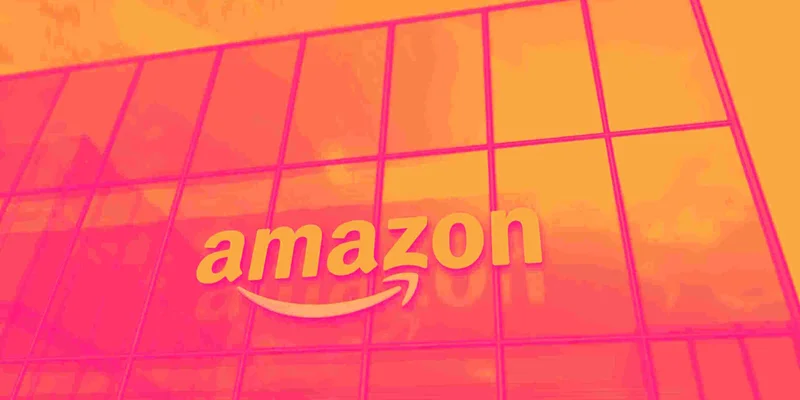So, Amazon's stock took a 5% haircut today. The sky, according to Wall Street, is officially falling. Every Amazon (AMZN) Investor Should Keep an Eye on This Number. The culprit? A projected drop in Free Cash Flow—down to a measly $23.5 billion for the year—all because the company is shoveling money into the great, roaring furnace of "Artificial Intelligence."
And I'm supposed to be shocked.
Give me a break. This isn't a surprise; it's an inevitability. For the last two years, every tech giant on the planet has been chanting "AI" like it's a magic spell that prints money. They’ve been telling us it's the future, the revolution, the second coming of the internet itself. Now the bill is coming due, and the market is acting like a kid who just realized his credit card isn't a piece of free plastic.
Let's be real. Amazon clawed its way back from burning cash in 2021 and 2022 to posting a healthy $38 billion in FCF last year. Things were looking up. They were acting like a grown-up company again. But the siren song of AI was too strong. The FOMO in Seattle must have been palpable. You could probably hear the nervous throat-clearing in boardrooms from space. So, they're back to their old tricks: spending like a drunken sailor on shore leave, all in the name of a technology nobody can quite define or monetize at scale.
This isn't an "investment." This is a panic move. It’s a $2.4 trillion company terrified of being left behind.
The All-In Bet on a Vending Machine That Sells Fog
What does "investing in AI" even mean at this scale? We're not talking about a scrappy startup with a cool algorithm. We're talking about a behemoth with $670 billion in sales. The forecasted cash burn is being chalked up to "huge capital expenditures." Translation: they are buying an obscene number of super-expensive computer chips from NVIDIA and building data centers the size of small cities to house them.
This whole AI arms race is like a global poker game where the buy-in is a hundred billion dollars. Everyone at the table is shoving their chips into the middle, bluffing and re-bluffing, but here's the kicker: nobody has looked at their cards yet. They're all betting on the idea of a royal flush. Amazon just showed a sliver of its hand, revealing it's willing to sacrifice its hard-won financial stability to stay in the game, and for the first time, some of the spectators are starting to get nervous.

And for what, exactly? So Prime can recommend a different brand of toilet paper with slightly more accuracy? So Alexa can sound a bit less robotic when she tells me it's raining outside? The promises are always grand and nebulous—curing diseases, solving climate change, creating art. But the immediate, tangible output for a company like Amazon seems... underwhelming. They're spending billions to build a vending machine that dispenses vaguely convincing fog.
When does this actually translate into profit that justifies torching a mountain of cash? No one has a clear answer. And that, right there, is why a 5% drop isn't just a blip. It's the first tremor of doubt.
We've Seen This Movie Before
I'm old enough to remember the dot-com bubble. The language was different—"synergy," "eyeballs," "new paradigm"—but the religious fervor was exactly the same. Companies with zero revenue were worth billions because they had a ".com" at the end of their name. We're back there again, only this time the magic suffix is "AI."
The difference is the scale. Back then, a spectacular flameout meant a few thousand people lost their jobs and some venture capitalists had to sell their third vacation home. Today, we're talking about a company that's effectively a public utility. A company whose market cap rivals the GDP of entire countries. When a company that big makes a multi-billion-dollar bet, it doesn't just affect shareholders; it warps the entire economy around its gravitational pull.
This isn't just about Amazon. It's about the collective delusion of an entire industry. They're all chasing the same handful of AI researchers, buying the same chips from the same supplier, and promising the same vaguely utopian future. It's a massive, industry-wide echo chamber, and the sound of their own voices is drowning out the one question that matters: is this sustainable?
I mean, I can't even get my local fiber provider to show up on time for an installation—a problem that requires a truck and a competent human, not a large language model. But we're supposed to believe these same tech giants are on the verge of creating god-like intelligence? It's absurd. This is a bad plan. No, 'bad' doesn't cover it—this is a five-alarm dumpster fire of capital allocation.
Then again, maybe I'm just a cynic. Maybe this really is the dawn of a new age, and Amazon is just paying the entry fee. But from where I'm sitting, it looks a lot like they're buying a lottery ticket with the entire company's lunch money. And offcourse Wall Street is starting to notice.
